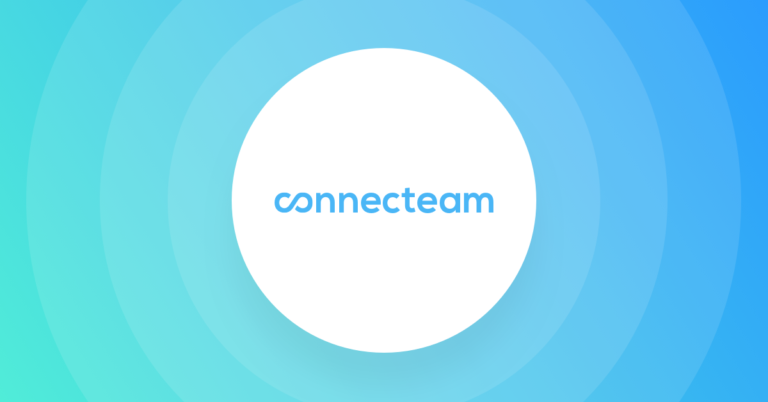Time tracking apps help contractors accurately log their hours, create invoices, and get paid on time. Check out my picks for the 7 best time-tracking apps for contractors.
As an independent contractor, tracking work hours helps you avoid mistakes in your invoices and delays in payment. However, time tracking can be incredibly difficult when you have many employees all working in different locations.
Luckily, there’s an easy solution. A time-tracking app is a simple, reliable way to keep track of the hours you and your subcontractors work. A digital time tracker not only ensures you get paid on time, but also helps you manage labor costs and budgets.
Check out my reviews of my top 7 favorite time tracking apps for contractors of 2025.
Our Top Picks
-
The best solution for accurate and efficient time tracking for contractors
-
Good for automatically tracking billable hours
-

Good for businesses using Quickbooks for payroll
Why trust us?
Our team of unbiased software reviewers follows strict editorial guidelines, and our methodology is clear and open to everyone.
See our complete methodology
25
Tools considered
16
Tools reviewed
7
Best tools chosen
What to Look For in a Time Tracking App for Contractors
After reviewing dozens of time tracking apps, here are the key features and capabilities I looked for to choose my top 7:
Important core features
- Mobile time clock. The app should include an easy-to-use time clock to accurately track your time.
- Geofencing and GPS tracking: Both ensure employees are on site while working and prevent time theft while clocked in.
- Automated timesheets and payroll. The best time-tracking apps automatically generate timesheets for you to reduce manual data entry.
- Reports: Reports provide insights into any time management issues you may need to address—for example, employees spending too much time on certain tasks.
- Payroll integration. I looked for apps that offer payroll integrations to make it easier to transfer employee timesheets directly to your payroll software for simple processing and to pay your employees on time.
- Break and overtime tracking. The app should automatically calculate breaks and overtime according to the rules you set.
I also checked for usability features, such as:
- Interface: It should have a user-friendly interface and not require much training for employees and staff to use.
- Cost-effective: Some apps charge per user, while others have a flat monthly fee. I chose software with fair and reasonable pricing models.
- Offers a trial period or demo: I ensured that all vendors on this list offer a trial period or demo version to give you a feel for the software.
- Customization: The ability to tailor the app to fit the specific needs of your business, such as custom work hours, roles, or permissions.
The 7 Best Time Tracking Apps for Contractors for 2025
-
Connecteam — Best all-in-one time tracking app for contractors
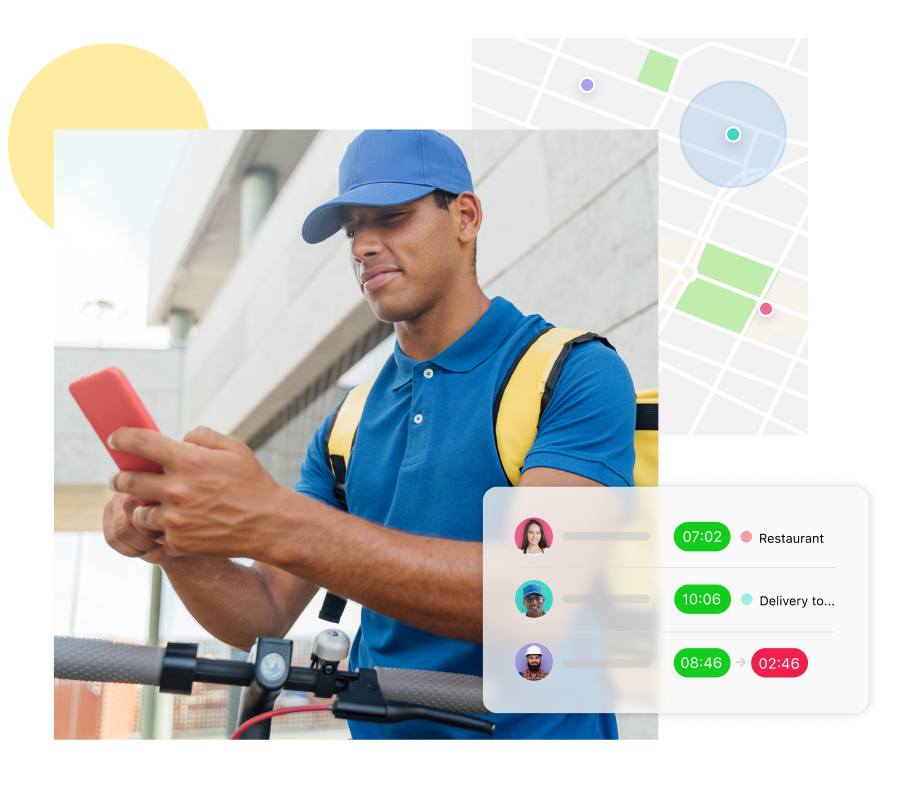
Connecteam is an all-in-one employee time tracking app that allows you to track your construction team’s work hours and manage accurate timesheets from anywhere.
Why I chose Connecteam: I use Connecteam on a daily basis and truly believe it’s the best mobile time-tracking app on the market.
The time tracking capabilities include a one-touch time clock, GPS tracking, job-specific time tracking options, break and overtime management, automated timesheets, time off management, and payroll integrations.
Let’s go over some of Connecteam’s key features and how the app can help you manage your contracting business:
One-touch employee time clock with GPS tracking
Connecteam’s employee time clock is incredibly easy to use for both employees and managers. Employees can clock in and out right from the app in their mobile devices, and even log breaks.
The real time GPS tracker is built into the time clock to ensure your employees are exactly where they need to be when on the job. Just keep in mind that your employees will have to activate their device’s GPS to clock in or out.
Depending on your preferred settings, you can log the exact location from which your employees clock in and out or track their real-time location the entire time they’re on the clock. I also love that you can also set up a digital geofence time clock around your workplaces to restrict the area from which your employees can clock in and out.
This allows you to avoid employees clocking in before getting to work and prevent buddy punching.
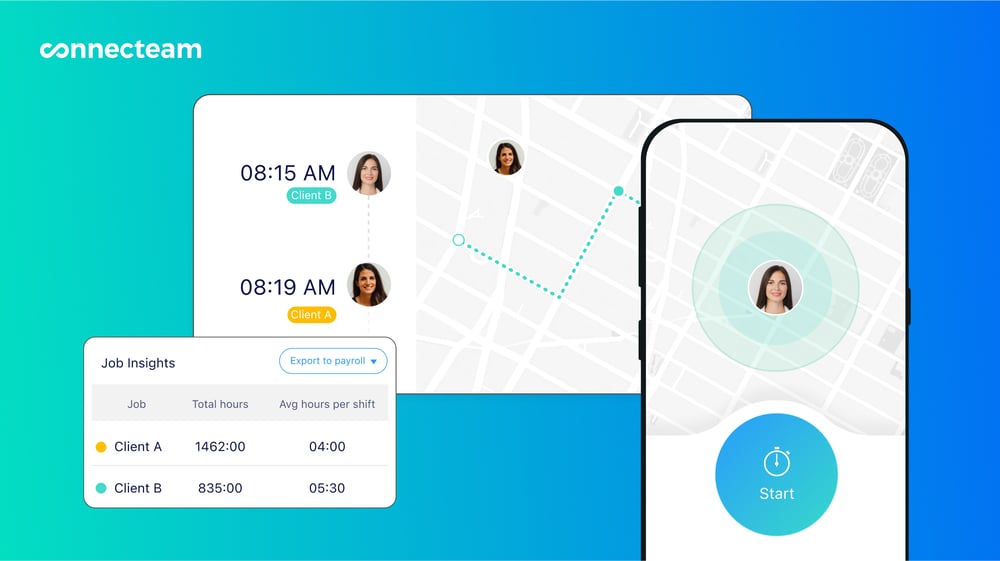
Automated timesheets
All employee hours are automatically transferred to digital timesheets for payroll, which you can view in the admin dashboard in your Connecteam account.
Here, you can see and review all logged employee hours, such as total daily work hours, the number of hours worked during a payroll period, overtime, breaks, and time off. The system also flags any irregularities so you can easily spot and correct payroll errors.
I also like that the app allows you to apply different pay rates per employee or job and the timesheets automatically calculate work hours, breaks, and overtime.
Employees can review their timesheets from their phones, request changes, and send in their approval before you process for payroll.
I also really like that Connecteam is incredibly customizable in terms of user permissions. For example, you can assign certain admins permission to approve timesheets and different admins permission to reopen timesheets, helping you stay in control of who has access to what information.
Time off and break management
Connecteam allows you to easily set up and manage your contracting company’s paid or unpaid time off policies for any kind of absence. You can also handle employee time off requests accordingly.
The system can then automatically calculate and process the absence according to your defined policies, notify the relevant employee of their request status, and document the process. This frees you from unnecessary back-and-forth, complicated manual calculation work, or scattered processes.
Generate reports for time management insights
I really love Connecteam’s reporting feature. You can access real-time information on work hours and labor costs to create customized reports. You can then generate and export reports by client or project.
Reports show how much time you spend on certain tasks or projects, helping you become more productive and boost efficiency.
Payroll integrations
Once you’ve approved employee hours and timesheets, you can export your timesheets directly to your payroll software or use one of Connecteam’s payroll integrations: RUN Powered by ADP®, Gusto, QuickBooks Online, Paychex and Xero. This allows you to skip the entire manual process, saving you valuable time and effort.
If you don’t already use one of these software for payroll, I found that you can easily sign up for one through the admin dashboard in your Connecteam account. Once you sign up for one of the payroll software, though, keep in mind it’s crucial to make sure employees’ names are identical in both Connecteam and whatever payroll integration you choose.
All time-tracking needs in one app
I found that Connecteam is the best employee time-tracking software for contracting and construction companies due to its ease of use, accurate time tracking, and abundance of features, including communication tools, HR management, scheduling, and more.
Integrations
Connecteam integrates with:
- Gusto
- Paychex
- RUN Powered by ADP®
- Quickbooks
- Xero
- Zapier
- Wix Bookings
- Lightspeed POS
Before Connecteam, it was a little difficult to keep up with those who may or may not have shown up for their shift on time, but also keep up with those who stayed extra. So with the time clock feature on the Connecteam app now, it does help to ensure those employees do get paid accordingly.
Connecteam also offers a free for life plan – Get Started Now!
Key Features
Mobile app for easy access from anywhere
Pros
All-in-one solution
Free plan
Intuitive and easy to use
Affordable pricing
Cons
Needs internet or wifi access to work
Pricing
Free-for-life plan availablePremium plans start at $29/month for 30 users
14-day free trial, no credit card required
Start your free trial -
Timecamp — Good for automatically tracking billable hours
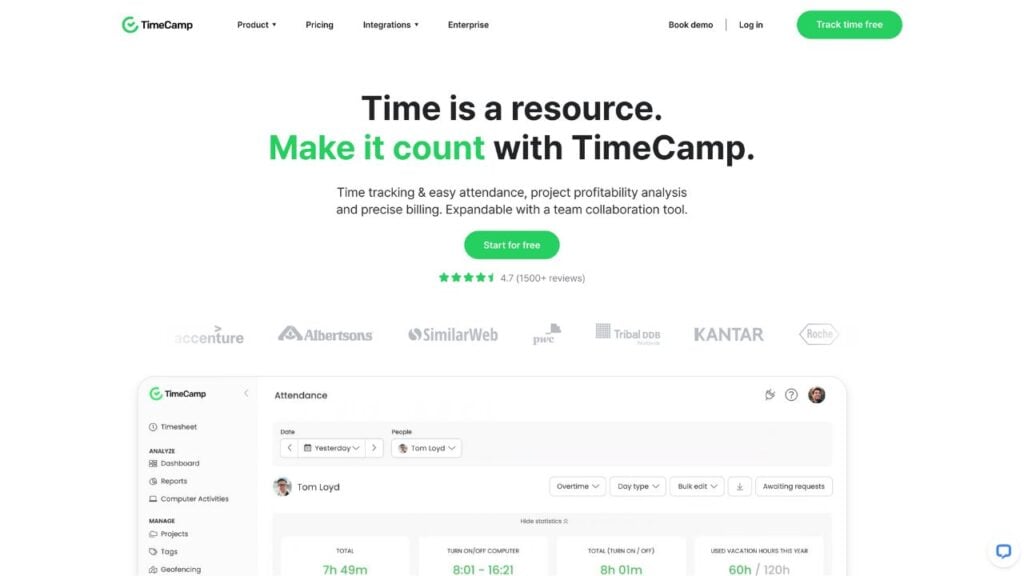
TimeCamp is a time-tracking app that helps contractors monitor hours, manage tasks, and optimize productivity with features like automatic tracking, reporting, and budget management.
From the moment I opened the TimeCamp app, it was clear how straightforward it is to set up. Within just a few minutes, I was already tracking hours, which is a huge plus when you’re on a tight schedule.
Why I chose TimeCamp: The interface is clean and modern, and I found it user-friendly even for people who aren’t particularly tech-savvy, something that’s often the case on job sites.
With TimeCamp, you can track employee hours in the office and in the field. The app runs in the background of both desktop computers and mobile devices, so you can track hours on jobs and tasks for both your office staff and crew members on-site.
Automated and manual time-tracking
I like that you can start and stop the timer in the app so it automatically records time, but also appreciate the option to manually enter time entries when needed.
While testing the recurring time entry feature, I could quickly duplicate daily tasks without having to set them up from scratch each day, which is a real time-saver when managing multiple job sites with repetitive tasks.
It’s important for me to note that the app does track which URLs and apps employees use during work hours, which may feel a bit invasive for some workers.
Keyword time tracking on the desktop app is one of TimeCamp’s standout features. You can assign keywords when creating tasks and the algorithm recognizes the keyword in the title of the document, app, or web page an employee is working on. The app will then track time against the task with the corresponding keyword.
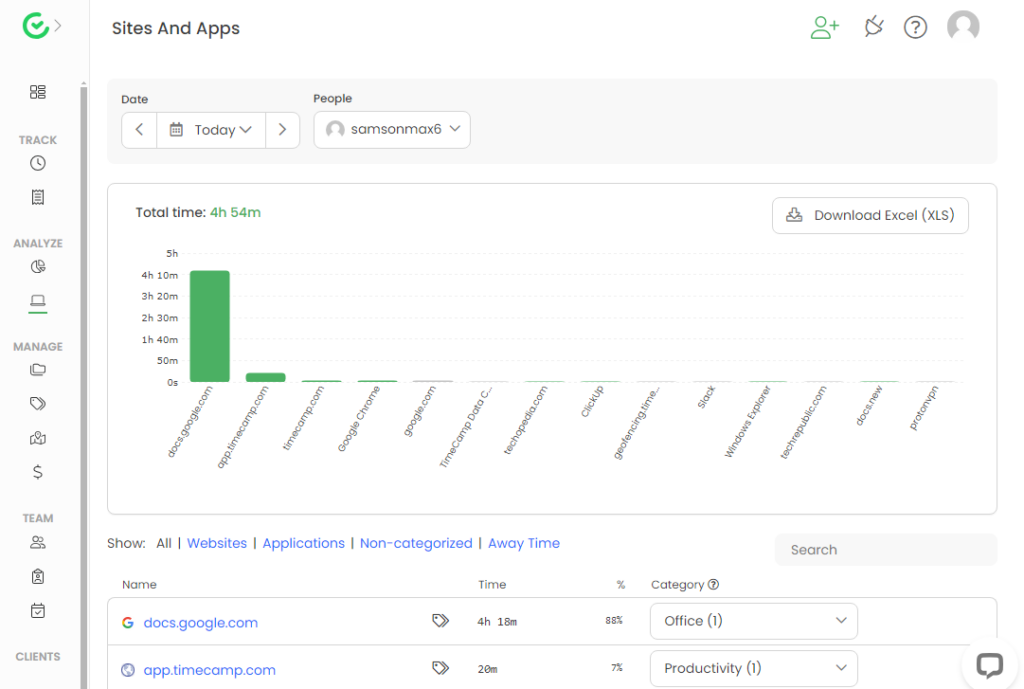
TimeCamp allows managers to quickly see where employees spend their time. Time budgeting and reporting tools
Timecamp’s time budgeting and reporting tools offer color-coded charts and graphs to make it easy to see where most employee time is being spent. I discovered I could generate over 20 different types of reports, which I found very impressive. They’re really useful to provide a clear picture of how your crew spends their time and where you might be able to cut back or allocate resources more effectively.
Integrations
Some of TimeCamp’s integrations include:
- Jira
- Salesforce
- Hubspot
- Zapier
- Xero
- Quickbooks
There are different ways to input your tracked time. You can register your tasks in real time or you can input it per day or week. This allows all of our employees the flexibility of tracking the way they want to. TimeCamp’s UI is also very intuitive, which makes the tool very easy to use.
Key Features
- Attendance tracking to monitor absences and time off
- Approve timesheets daily or weekly
- Make comments on timesheets
- Clients can pay invoices with PayPal
Pros
- Over 70 integrations
- Ability to create budget estimates
Cons
- Automated time tracking can cause errors
- Free plan doesn’t include reports or integrations
Pricing
Starts at $2.99/user/month Trial: Yes Free Plan: Yes
-

QuickBooks Time — Good for businesses using Quickbooks for payroll

QuickBooks Time, formerly known as TSheets, is a cloud-based time tracking and employee scheduling app designed to help contracting businesses accurately track work hours, manage employee schedules, process payroll, and invoice accurately.
Why I chose QuickBooks Time: I like how easy it is for employees to clock in and out of work and add details to timesheets. As an admin, you can view everyone’s hours in one place and easily change job codes and time card options.
Employee time clock and digital timesheets
Crew members can clock in and out of work from their job sites directly from their mobile devices. This ensures that everyone’s hours are logged correctly, including the start and end times of shifts, breaks, and overtime, directly through the app.
While testing the software, I found that you can also add notes to timesheets if, for example, you want employees to include details about their daily jobs or tasks. I also found that the mobile app synchronizes data in real-time, ensuring that timesheet information is always up-to-date and accessible by both employees and managers.
I found that the real-time tracking by specific cost codes or departments is great for precise project management and cost control. I also appreciated the ability to attach notes to time entries, and that managers can easily edit them when needed.
See who’s working at any given time
The “See Who’s Working” feature provides a live dashboard showing which crew members are currently clocked in. This visibility helps you better adjust staffing in real time based on workload demands and ensures accurate time tracking for payroll.
Quickbooks Time also offers GPS tracking to see the locations of clock-in employees.
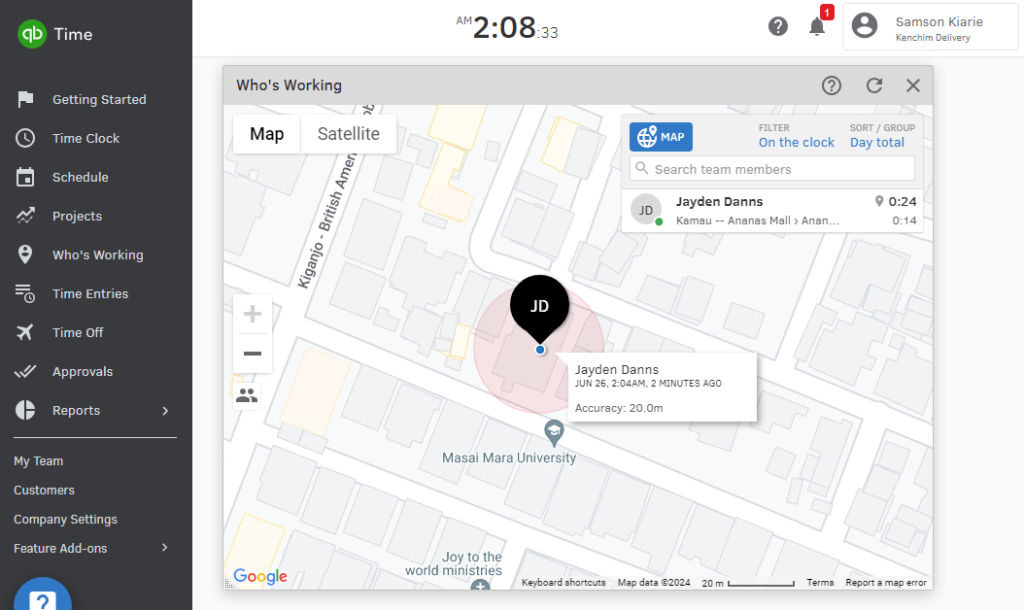
QuickBooks Time enables you to track the real-time location of field employees. Customizable reports for payroll
Of course, Quickbooks Time integrates with QuickBooks Payroll which is convenient if you are already a Quickbooks user. You’ll save a lot of time since there’s no need to switch between different systems to manage time and payroll.
I also really like how customizable Quickbooks’ payroll reports are. I found you can view detailed reports on work hours, overtime, and breaks for each employee, tailored to the specific payroll period. Reports can be customized to include or exclude specific data points, making it easier to align with payroll requirements.
Integrations
Some of Quickbooks’ integrations include:
- Square
- ADP
- Paychex
- MakeShift
- Aero
- OnPay
- JazzHR
With GPS tracking, you can easily see that the employee was on site at the time that they clocked in. Also, rather than just being “on the clock”, the software allows the employees to clock in specifically to the job that they are on and switch jobs mid-day if they go to multiple job sites, making job costing a breeze.
Key Features
- Managers can review who’s working and what they’re working on
- Reports
- Alerts for schedule changes, timesheet approvals, and overtime
- GPS and geofencing
Pros
- Included with QuickBooks Online Payroll Premium and Elite
- Activity feed
Cons
- Features and integrations can get confusing
- Can be expensive, especially for large teams
Pricing
Starts at $20/month + $10/user/month Trial: Yes — 30-day Free Plan: No
-

Harvest — Good for time-tracking reports
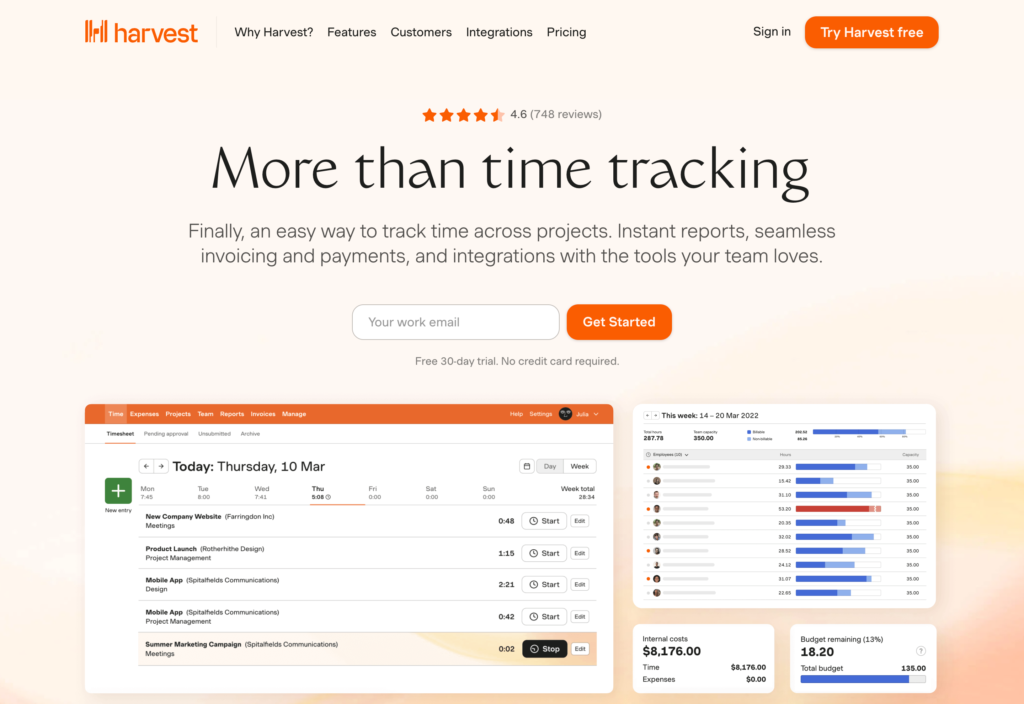
Harvest is a contractor time tracking app that can track expenses and hours worked for different tasks, clients, and projects.
Why I chose Harvest: I like that you can generate reports to see time spent on specific jobs or projects, their progress, budget, and the time left to complete them You can also add notes to time entries to detail what you’ve worked on.
Multiple methods for time tracking
After testing Harvest, I found its time-tracking features to be both versatile and user-friendly. The app offers several methods for tracking time, including manual entry, a timer, and the ability to allocate time directly to specific projects. The interface for starting and stopping the timer is also really intuitive. However, I did notice that while testing the timer from my desktop, it continued running even after I turned off my computer, which can lead to payroll errors.
Manual entries are straightforward—just fill in the project details and time spent, which is a great backup if you forget to start the timer. The weekly timesheet view is helpful for getting a quick overview, but a monthly view filtered by clients, tasks, or roles would make it easier to manage multiple projects.
While Harvest allows setting capacity limits, it doesn’t provide automatic notifications when you exceed these limits or calculate overtime, which can be problematic for contractors needing to comply with labor laws.
The lack of GPS tracking is another drawback for field-based contractors who need to verify workers’ locations. Additionally, the absence of real-time alerts for budget limits might lead to overspending before it’s noticed.
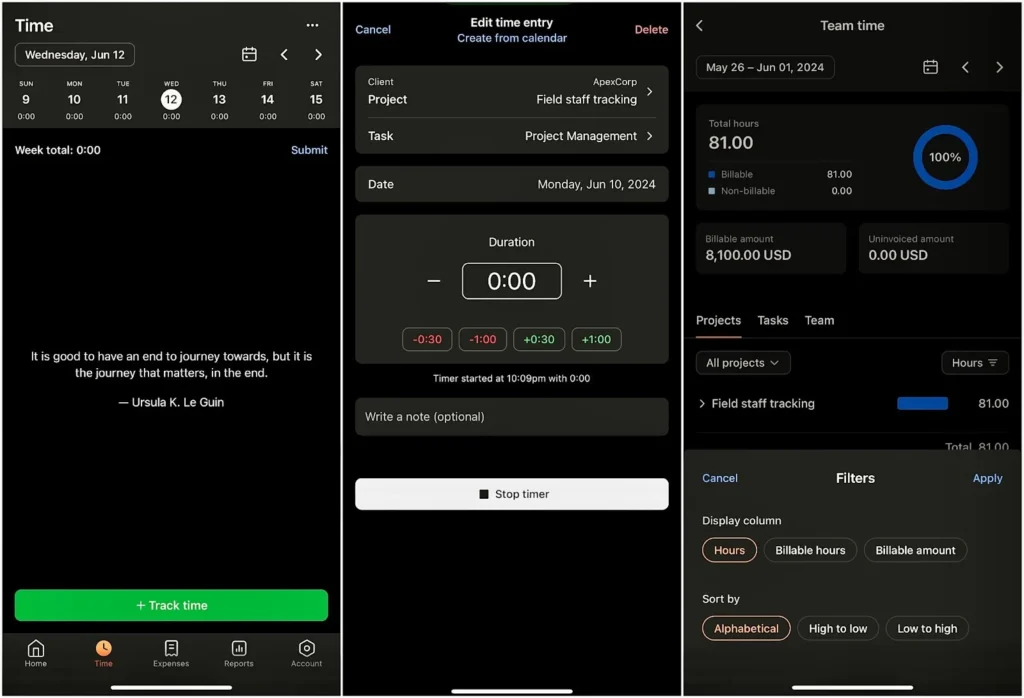
Harvest allows employees to clock in and out right from their mobile devices. You can also edit time entires as needed. Integrations
Some of Harvest’s integrations include:
- Zapier
- Alfred
- Zendesk
- Trello
- Stripe
- Basecamp
- Asana
By having a clear vision of how my time is being used, I can identify areas in which they could be more efficient and make adjustments to optimize workflow in each task, this gives me a feeling of real-time optimization.
Key Features
- Time tracking
- Expenses
- Invoices
- Estimates
- Reports
- Timesheets
Pros
- Simple to use
- Tracks paid and unpaid invoices
Cons
- Free version is only for a single user and two projects
- Becomes expensive for larger teams
Pricing
$11/user/month Trial: Yes — 30 days Free Plan: Yes — Up to 1 seat & 2 projects
-

Procore — Good for creating customizable time-tracking templates

Procore is a contractor time tracking app and project management platform for the construction industry.
Why I chose Procore: I like that Procore is specifically designed for the construction industry. Contractors can log their time in the field, and managers can then export timecards for payroll.
Organized time tracking
Procore offers an employee time clock with GPS functionality, making it easy to verify that workers are clocking in and out from the correct job site.
The core of Procore’s time tracking revolves around its Daily Log feature. Here, you can accurately track daily activities on job sites and document all aspects of a project’s daily operations in one place.
You can record time entries for each worker or subcontractor on any project, including clock-in and clock-out times, breaks, and all tasks workers performed. Supervisors can manually enter time data or use the time clock to track it automatically. Procore also conveniently supports different types of time entries, such as hourly or lump-sum entries, making it adaptable to different billing methods.
The Log automatically compiles all time entries into timesheets, which you can review or adjust. The software also supports automated reminders to ensure that employees submit their hours on time, reducing the likelihood of missing or incorrect data.
Customizable time-tracking templates
I really like that Procotre offers customizable time-tracking templates that you can tailor to each project’s specific needs. For example, I created a template including fields for cost codes and project phases for more control over how labor data might be recorded and used. This flexibility allows you to categorize hours by specific tasks or roles, which is incredibly useful for detailed cost tracking and analysis.
These templates also make it easy to standardize timekeeping across multiple projects. You can design a template once and then use it repeatedly for similar jobs. I found the ability to include custom fields, such as overtime rates or certification requirements, to make the tracking process more accurate. Plus, by automating these entries, you can minimize manual data entry.
Integrations
Some of Procore’s integrations include:
- ShapeDo
- SALUS
- Qflow
- ProNovos
- Vertical
- Zapier
As a construction professional, finding the right tools to streamline project management is crucial, and Procore has truly transformed how we handle our projects. From the outset, Procore’s user-friendly interface and comprehensive features have made a significant impact on our workflow.
Key Features
- Set billable hours on projects
- Track billable and non-billable hours
- Copy timecards to avoid re-entering project data
- Filter timecards by date, worker, or project
Pros
- Includes bid management and estimate features
- Workforce planning included
Cons
- Not for companies outside the construction industry
- Pricing isn’t transparent
Pricing
Contact vendor for price Trial: No Free Plan: No
-
Jibble — Good for project time tracking
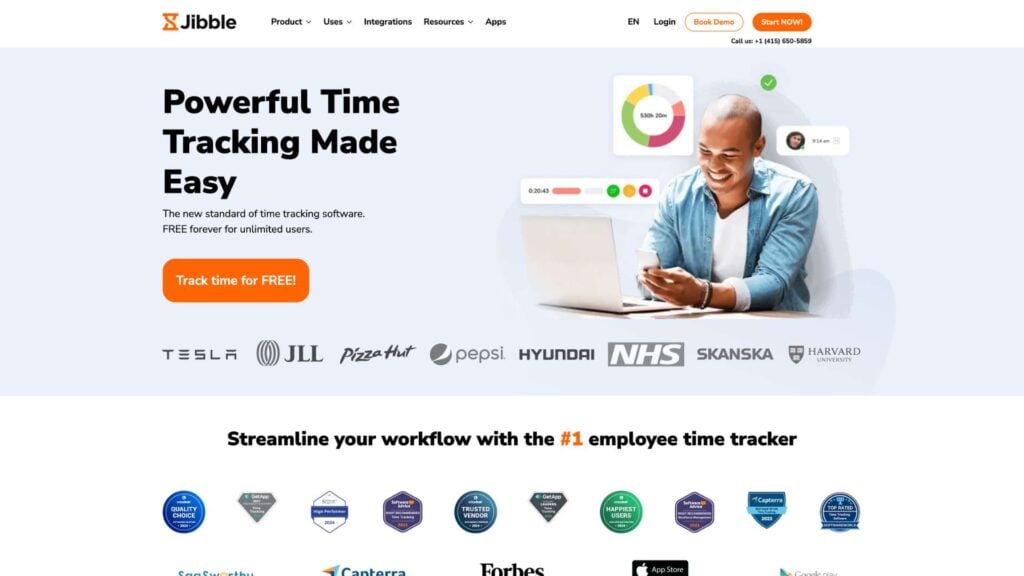
Jibble is dedicated entirely to time tracking and is incredibly useful for contractors and construction teams.
Why I chose Jibble: I like how you can customize Jibble based on your needs. It has multiple pricing tiers and even offers a free plan for basic time tracking.
I also really like how easy it is to register and get started with the software.
Easy-to-use employee time tracking
Within Jibble, you can set specific rules for each employee’s break times, including how many breaks they can take and when. Additionally, you can designate which projects each employee should record their hours against using an easy-to-use, color-coded form.
I also like that workers have the flexibility to clock in and out and track their project hours using smartphones, tablets, or computers. Whether they’re on-site or in the field, they can simply tap a button on the app to start the clock.
Another neat feature is facial recognition. Crew members can clock in and out with this technology, saving them time and eliminating the need for manual entries, which reduces errors and ensures accurate attendance records.
Jibble also comes with GPS tracking to prevent time theft and verify that employees are actually present at their job sites while clocked in.
I also appreciate that Jibble offers three time-tracking policies—flexible, moderate, and strict—each with its own unique settings.
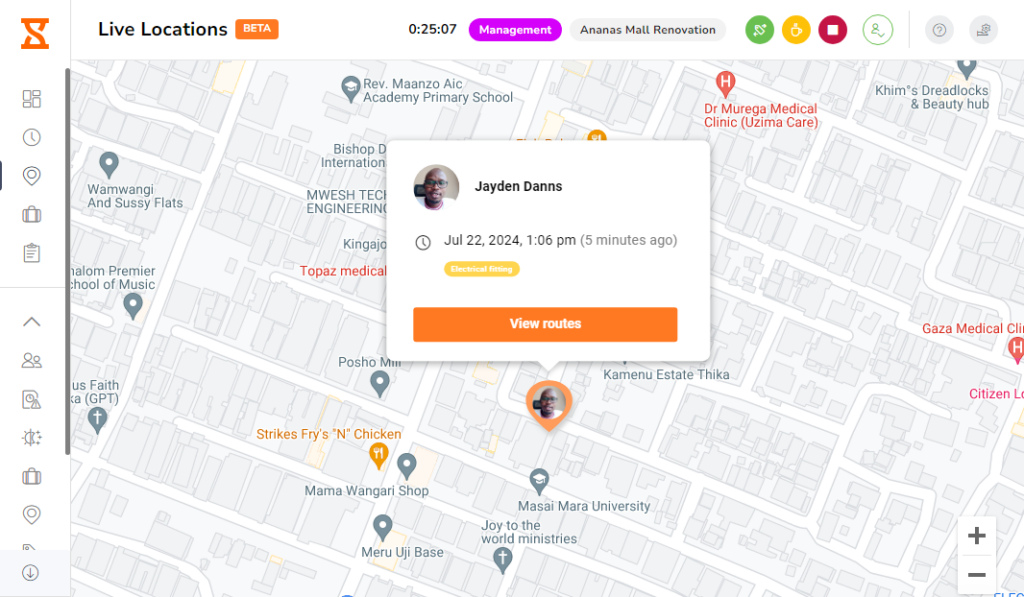
Jibble allows you to view employee’s real-time locations using GPS tracking Employee timesheets
Jibble automatically compiles all crew hours into digital timesheets, making it easy for contractors and construction managers to review. I discovered that timesheets update instantly when team members log their hours, allowing both workers and supervisors to quickly verify accuracy.
You can easily monitor which crew members are clocked in using daily, weekly, or monthly calendar views. If you notice any discrepancies, you can quickly correct the timesheets before approving them for payroll.
Jibble also allows you to export detailed work logs and project hours, ensuring you have precise records for client billing and project cost tracking.
Simplified attendance tracker
I really like how the attendance tracker provides a clear overview of employee attendance patterns. It automatically records employee absences and late clock-ins and compiles this data into attendance reports.
You can use these reports to monitor attendance trends, identify patterns of absenteeism, and make informed decisions regarding staffing and employee performance. The feature also allows employees to apply for time off directly through the app. You can easily review and approve or deny requests, ensuring that you meet your staffing needs.
Integrations
Some of Jibble’s integrations include:
- Airtable
- Paylocity
- Asana
- ClickUp
- Oracle
- Freshdesk
- Notion
Love the ease of use, the integrations, the mobile app and the ability to track time in an accessible platform that was quick to set up and explain to our employees.
Key Features
- Time tracking
- Live location tracking
- Time off management
- Activity monitoring
- Adjustable timesheets
Pros
- Can bill automatically for hours worked
- Facial recognition for clocking in and out
Cons
- No shift scheduling
- Limited reports export and sharing options
Pricing
Starts at $2.99 per user/month Trial: Yes — 14 days Free Plan: Yes
-
Clockify — Good for employee monitoring
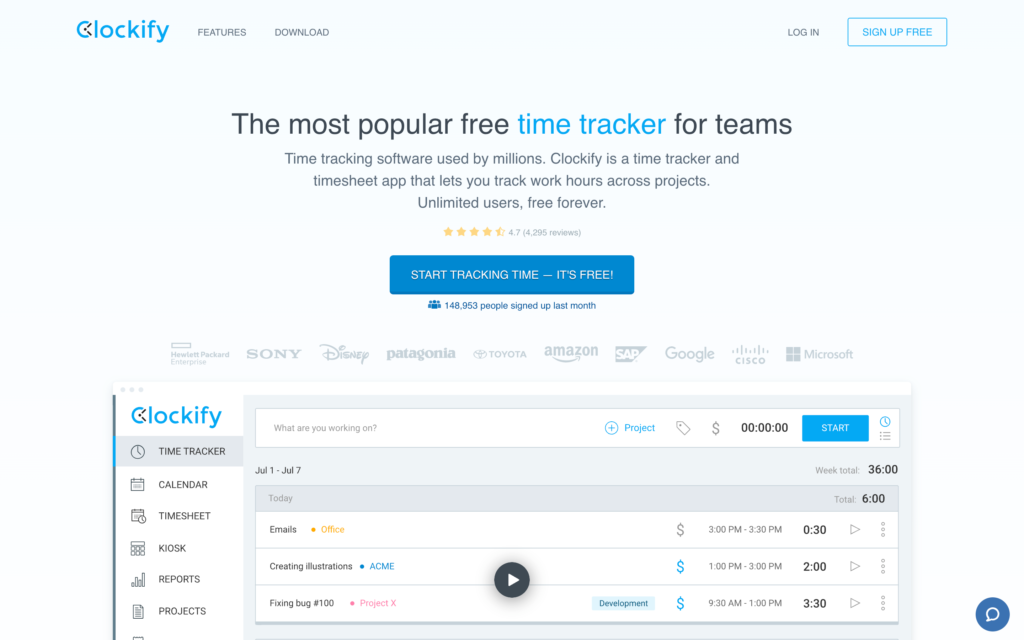
Clockify is a time tracking and project management app tool that helps contractors and construction teams track work hours and manage tasks.
Why I chose Clockfiy: I like that Clockify offers versatile tracking options across multiple devices, precise time management features, and the ability to customize time entries for different projects.
Versatile time tracking
Clockify offers contractors multiple ways to track employee hours, including a desktop app, browser extensions, and Android and iOS mobile apps. Admins can set up on-site kiosks or add time for their teams, and both admins and users can adjust entries. However, I was glad to see that you can disable manual time entry for employees. The time tracking is accurate to the second, with an optional rounding option for payroll.
Employees can easily clock in for work and track their hours by clicking the Play button on the mobile app. They then must select a client, project, and task, and press Stop when their shift is over. They can also add tags, mark time as billable or non-billable, and clock in and out of breaks. As a manager, you can view these breaks alongside other activities, although I was disappointed to see that there is no feature to enforce break rules or automatically schedule them.
Admins can enable GPS tracking and screenshots, but geofencing and kiosk selfies are not yet available, making it less ideal for managers needing strict on-location tracking.
Another downside I discovered was that switching tasks requires employees to stop and restart the timer, which is inconvenient unless using Kiosk mode.
Time off management
Contractors and construction team members can easily request and approve time off directly within the Clockify app. Managers can then view all requests in one place, categorize them by type, such as vacation, sick leave, or personal days, and set custom accrual policies, ensuring accuracy and transparency in leave management.


Clockify’s time off feature color codes the status of each request. I discovered that this feature integrates with Clockify’s overall time-tracking system, allowing managers to see who is off and make informed decisions about project planning and scheduling.
While basic, the time-off feature is flexible enough to accommodate a range of needs, such as different leave types and accrual methods. However, it lacks advanced options like automated notifications or detailed reporting, which could benefit larger teams with more complex leave requirements.
Integrations
Some of Clockify’s integrations include:
- Basecamp
- ClickUp
- Wrike
- Monday.com
- Trello
- Jira
- Asana
- YouTrack
I appreciate the user-friendly interface and how easy it is to track time across different projects. The reporting features are very robust, allowing for detailed insights and analysis. The integration with other tools is seamless, which enhances productivity.
Key Features
- Time tracking
- Scheduling
- Project management
- Reporting
Pros
- Free plan with unlimited users
- Simple, straightforward time tracking
Cons
- Dated, sometimes clunky interface
- Limited project, task, and shift management
Pricing
Starts at $3.99/user/month Trial: Yes — 7 days Free Plan: Yes
Compare the Best Time Tracking App for Contractorss
| Topic |
 Start for free
Start for free
|
|

|

|

|
|
|
|---|---|---|---|---|---|---|---|
| Reviews |
4.8
|
4.7
|
4.7
|
4.6
|
4.5
|
4.9
|
4.8
|
| Pricing |
Starts at just $29/month for the first 30 users
|
Starts at $2.99/user/month
|
Starts at $20/month + $10/user/month
|
$11/user/month
|
Contact vendor for price
|
Starts at $2.99 per user/month
|
Starts at $3.99/user/month
|
| Free Trial |
yes
14-day
|
yes
|
yes
30-day
|
yes
30 days
|
no
|
yes
14 days
|
yes
7 days
|
| Free Plan |
yes
Free Up to 10 users
|
yes
|
no
|
yes
Up to 1 seat & 2 projects
|
no
|
yes
|
yes
|
| Use cases |
Best all-in-one time tracking app for contractors
|
Good for automatically tracking billable hours
|
Good for businesses using Quickbooks for payroll
|
Good for time-tracking reports
|
Good for creating customizable time-tracking templates
|
Good for project time tracking
|
Good for employee monitoring
|
| Available on |
What Is a Time Tracking App for Contractors?
Time tracking software for contractors helps them accurately track the time they work. They can log hours worked, categorize time entries by project or client, and generate timesheets and reports. They can also create invoices and manage budgets, expenses, and hours worked on each project. Some time tracking apps offer extra features like payroll integrations, absence and break management tools, GPS location tracking, and more.
For contractors, time-tracking apps are essential. Apps keep accurate records up to the second, so you can budget for projects and pay everyone fairly, even when your workers are on site.
How Does a Time Tracking App for Contractors Work?
Time tracking apps for contractors include clocks that contractors can turn on and off to indicate when they’re working on a project. Most have automated time tracking that starts when you clock in and stops when you clock out. These apps can also enable you to:
- View analytics to help you evaluate project profitability, costs, and more.
- Set and see time-tracking details, such as subtasks that a contractor worked on.
- Create and send invoices.
- Generate automatic timesheets.
- Track expenses.
- Integrate with payroll software.
- Set different billable hours and hourly rates for different employees, clients or projects.
- Monitor performance.
- Edit time entries, in case a clock didn’t start or stop on time.
Some time tracker apps include features for workforce time clock, task management, project management, and more.
The Benefits of a Time Tracking App for Contractors
These are the primary benefits of using a time tracking app in your contractor business:
Accurate billing
These apps ensure you can precisely track the number of hours spent on each project, leading to accurate client invoicing and reducing disputes over billable time.
Enhanced productivity
Contractors can identify time-consuming tasks and optimize workflows, helping teams stay focused and efficient.
Improved project management
Real-time insights into hours worked allow contractors to manage deadlines effectively and allocate resources appropriately.
Compliance and accountability
Time tracking apps provide a transparent record of work hours, supporting compliance with labor laws and building trust with clients.
Streamlined payroll
Automated time tracking simplifies payroll processing, reducing errors and saving administrative time.
Cost control
By monitoring time spent on various tasks, contractors can better control labor costs and make informed decisions about project budgets.
Mobility and flexibility
These apps allow teams to clock in and out from any location, which is essential for contractors working across multiple sites.
How Much Does a Time Tracking App for Contractors Cost?
Most time management and tracking apps for contractors cost a set price per month, with an additional charge for every user. Teamwork, for example, is $5.99 per user, per month, while Harvest costs $10.80 per user, per month. Higher-priced tiers generally include more features.
Connecteam is the best time-tracking app for contractors and the perfect all-in-one work management solution, thanks to its robust features and affordable price. Its Small Business Plan is 100% free for life for up to 10 users. Paid tiers start at just $29 per month for up to 30 users, plus only $0.50 for each additional user.
FAQs
A mobile app is one of the best options for tracking hours worked. It’s more accurate than using an online timer and a spreadsheet. Apps also make it easy to track specific tasks and subtasks.
Start with clear expectations. You can use a time tracking app to see where employees are spending their time and to manage performance. Some apps even include GPS and geofencing to help managers monitor contractors.
Contractors need to create a schedule, stay organized, and reduce interruptions. Time-tracking apps can help contractors with this. Workforce time clocks enable contractors (and their managers) to better understand how they’re spending their time. Some apps even track productive and unproductive time to help contractors stay efficient.
The Bottom Line on Time Tracking Apps for Contractors
Contractors need an easy, efficient way to track time, especially when they’re on site. Spreadsheets and timers can result in inaccurate timekeeping and incorrect pay. Time tracking apps help contractors accurately track their hours, with just one click or tap of a screen. They can even generate reports to help managers monitor projects’ progress and labor costs. Plus, they help simplify payroll and invoicing processes and boost productivity.
Connecteam is the best time-tracking app for contractors. With Connecteam, you can clock in and out with one touch, know where contractors are with GPS tracking, manage paid time off requests, and more. With additional features for everything from scheduling to human resources management, Connecteam is the do-it-all solution to help you make the most of your workdays.
Sign up for a free 14-day trial of Connecteam now and see how it can help streamline your contracting business.


